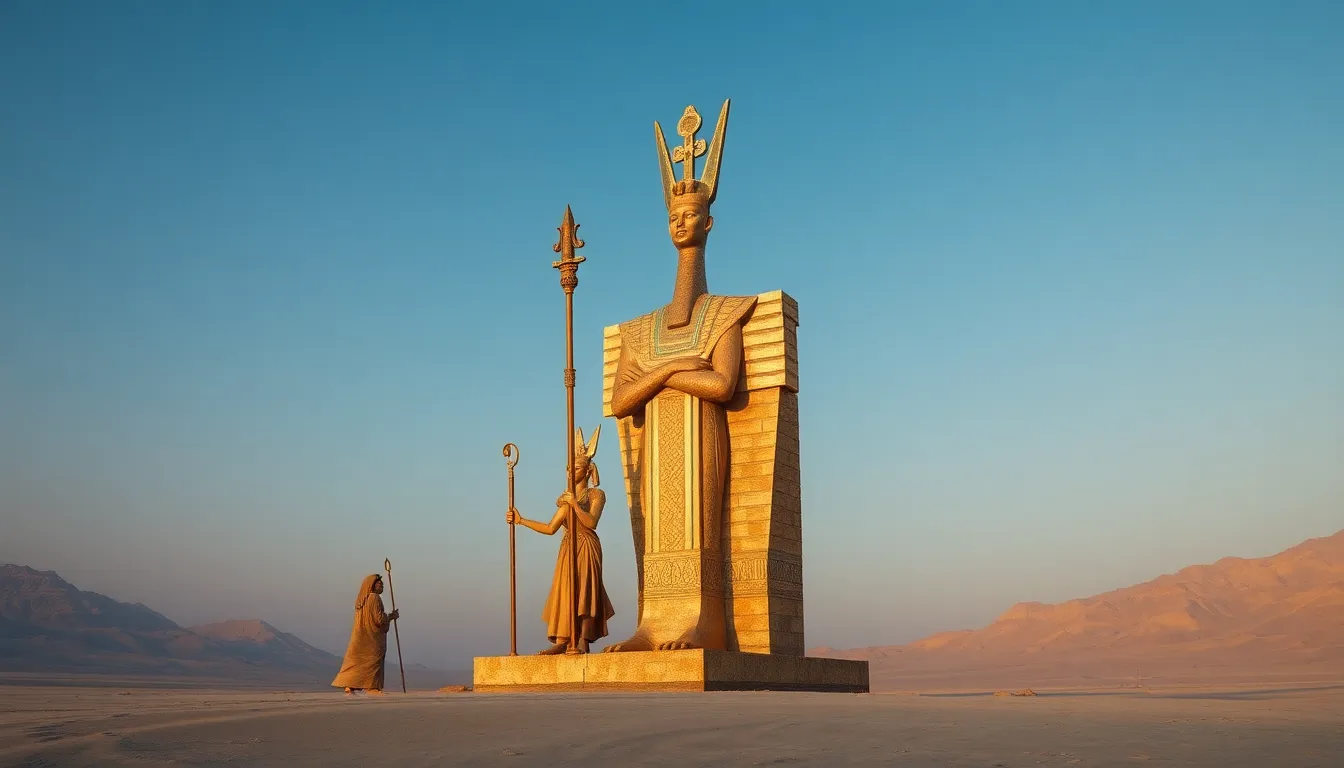The Role of the Ancestors in Egyptian Cosmological Thought
I. Introduction
Ancient Egyptian cosmology is a fascinating tapestry of beliefs that intertwine the divine, the natural world, and the afterlife. Central to these beliefs is the role of ancestors, who were revered not only as familial figures but also as spiritual entities that influenced the living. This article aims to explore the multifaceted role of ancestors in Egyptian cosmological thought and their enduring significance in both ancient and modern contexts.
II. Understanding Egyptian Cosmology
A. Definition of cosmology in ancient Egypt
In ancient Egypt, cosmology encompassed the understanding of the universe’s origins, structure, and function. It involved a complex interplay of gods, nature, and the afterlife, creating a framework within which the Egyptians interpreted their existence and purpose.
B. Key elements of Egyptian cosmological thought
Key elements of Egyptian cosmological thought include:
- The creation myths involving deities like Atum, Ra, and Osiris.
- The cyclical nature of life, death, and rebirth.
- The belief in an ordered universe governed by Ma’at, the principle of truth and balance.
C. The interplay between gods, nature, and the afterlife
Egyptian cosmology emphasizes the interconnectedness of gods, nature, and the afterlife. The gods are seen as powerful forces that shape the natural world, and the afterlife is viewed as a continuation of existence where ancestral spirits play a pivotal role.
III. The Concept of Ancestors in Egyptian Society
A. Definition of ancestors in the context of ancient Egypt
In ancient Egypt, ancestors were considered the deceased family members who continued to exist in a spiritual realm. They were believed to maintain a connection with the living, influencing their lives and providing guidance.
B. The lineage and family structure in Egyptian culture
Egyptian society was deeply rooted in family ties and lineage. Ancestry was crucial for identity, status, and inheritance. Family structures often honored ancestors through the preservation of names and legacies.
C. Ancestors as spiritual guides and protectors
Ancestors were viewed as protectors of their descendants, offering wisdom and guidance. They were believed to intercede with the gods on behalf of their living relatives, ensuring their well-being and prosperity.
IV. Ancestors and the Afterlife
A. Beliefs about the afterlife in ancient Egypt
The ancient Egyptians held a profound belief in the afterlife, viewing it as a journey that began after death. The concept of the “Field of Reeds,” a paradise where the soul could thrive, was central to their afterlife beliefs.
B. The role of ancestors in guiding the deceased
Upon death, it was believed that ancestors played a crucial role in guiding the deceased through the afterlife. They provided support and protection during the judgment process by Osiris, the god of the underworld.
C. Rituals and practices to honor and communicate with ancestors
Rituals such as offerings, prayers, and festivals were common practices to honor ancestors. Families would place food, drink, and items in tombs, believing that these offerings would nourish the spirits of their loved ones.
V. Ancestors in Religious Practices
A. Ancestor worship and its significance
Ancestor worship was an essential aspect of ancient Egyptian religion. It fostered a sense of continuity between the past and present, allowing individuals to maintain a connection with their heritage.
B. Temples and shrines dedicated to ancestral spirits
Many families constructed shrines and temples where they could honor their ancestors. These sacred spaces served as focal points for prayer and offerings, reinforcing familial bonds across generations.
C. Festivals and rituals that honor ancestors
Several festivals were dedicated to honoring ancestors, such as the “Feast of the Valley,” where families would gather to celebrate and remember their deceased relatives. These events were characterized by communal feasting and ritualistic offerings.
VI. Symbolism of Ancestors in Egyptian Art and Literature
A. Depictions of ancestors in hieroglyphics and tomb paintings
Ancestors were often depicted in hieroglyphics and tomb paintings, symbolizing their importance in the afterlife. Artistic representations served to immortalize their memory and convey their significance in the spiritual realm.
B. Literary references to ancestors in ancient texts
Ancient Egyptian literature frequently referenced ancestors, highlighting their wisdom and guidance. Texts such as the “Book of the Dead” provided instructions for the deceased, emphasizing the role of ancestors in the afterlife journey.
C. The symbolism of ancestors in Egyptian mythology
In Egyptian mythology, ancestors were often associated with specific deities, reinforcing their role as mediators between the living and the divine. Their symbolism extended to themes of resurrection, continuity, and protection.
VII. The Legacy of Ancestors in Modern Egyptian Culture
A. Continuation of ancestor veneration in contemporary practices
In modern Egyptian culture, the veneration of ancestors persists through various practices, such as visiting graves and holding memorial services. These customs reflect a deep-seated respect for familial ties and heritage.
B. Influence of ancient beliefs on modern Egyptian identity
The ancient beliefs surrounding ancestors continue to shape modern Egyptian identity, serving as a connection to the rich cultural history of the nation. This legacy is evident in language, rituals, and societal values.
C. Preservation of ancestral traditions in modern society
Efforts to preserve ancestral traditions are visible in festivals, storytelling, and family gatherings. These practices ensure that the memories of ancestors live on, bridging the gap between past and present.
VIII. Conclusion
In summary, the role of ancestors in Egyptian cosmological thought is multifaceted and profound. Their significance extends beyond mere memory, influencing religious practices, artistic expression, and cultural identity. The enduring legacy of ancestor veneration continues to play a vital role in shaping the cultural memory of Egypt, reflecting the deep connections between the past and the present. As we reflect on the impact of ancestral beliefs, we gain a deeper appreciation for the intricate web of relationships that define Egyptian history and culture.




